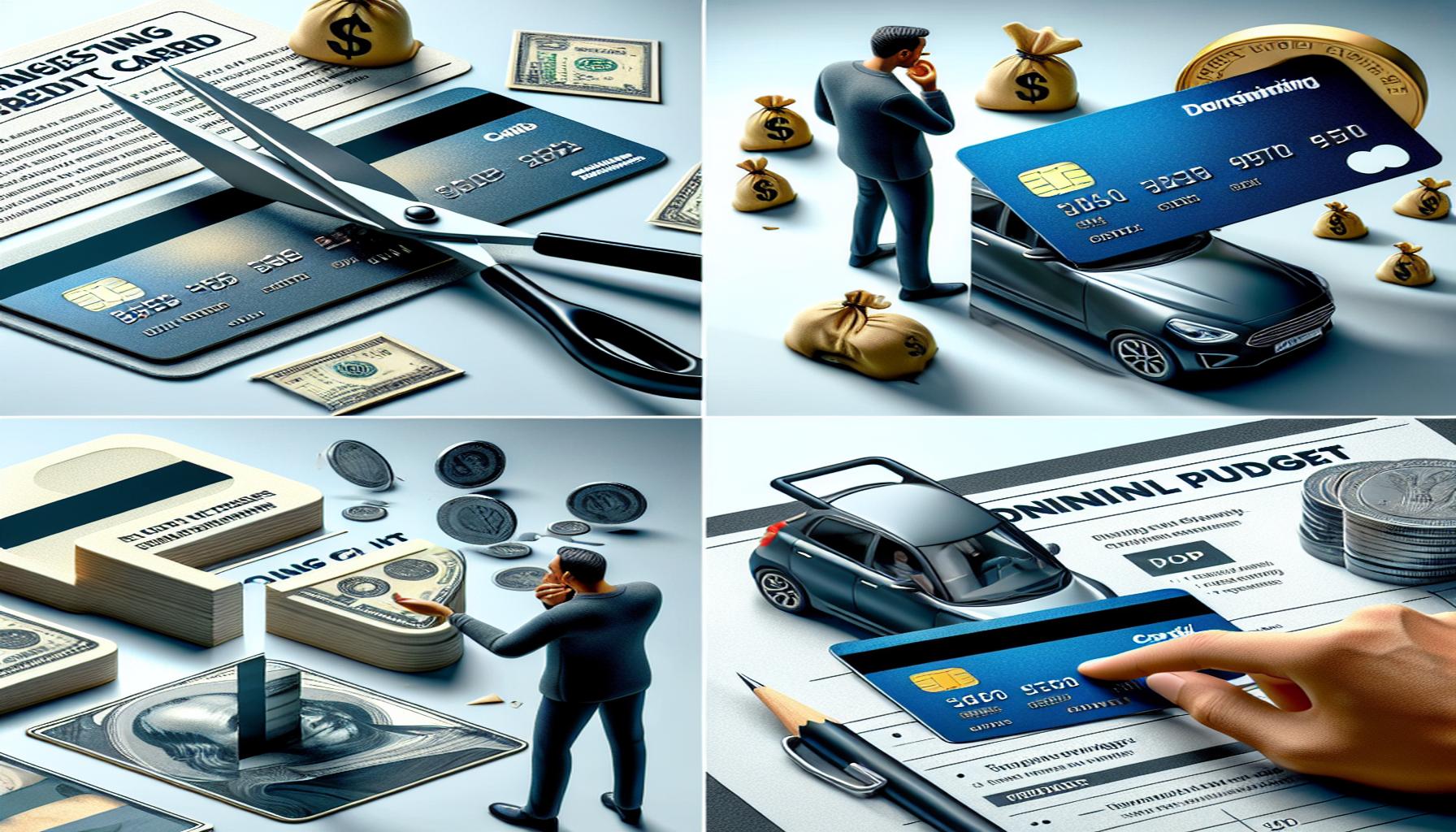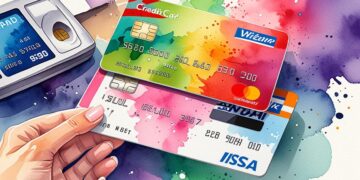Common Errors when Using a Credit Card and How to Avoid Them

Understanding Common Credit Card Mistakes
Many Australians use credit cards as a convenient payment method. However, it’s easy to make mistakes that can lead to financial strain. Understanding these common errors is the first step towards better management of your finances.
Common Mistakes to Avoid
- Missing Payments: One of the most common pitfalls is missing credit card payments. Failing to make on-time payments can result in hefty late fees and increased interest rates. For example, if your credit card payment due date is on the 5th of each month and you miss it, you could incur a fee of up to $35. Moreover, repeated missed payments can significantly lower your credit score, making it harder to obtain loans in the future.
- Overusing Credit: Many Australians find themselves exceeding their credit limits, thinking that it will not have immediate repercussions. However, going over your limit can lead to additional charges and potential penalties imposed by the credit card issuer, which can adversely affect your credit score. If your limit is $5,000 and you consistently use $5,200, you may face a penalty fee, and your credit rating could suffer as a result, making it tough to secure future credit.
- Ignoring Interest Rates: Understanding how interest applies to your transactions is crucial. Credit cards often come with varying interest rates depending on your credit score and payment history. If you carry a balance from month to month, interest can accumulate quickly. For example, if your card has an interest rate of 18% and you maintain a running balance of $1,000, you will pay a considerable amount in interest charges over time. This is why paying your balance in full each month is highly advisable.
- Neglecting Rewards: Many credit cards offer rewards or cashback programs, but these benefits are often overlooked. For instance, if your card offers 1% cashback on all purchases, you could earn $100 back on every $10,000 spent. By simply using your card for everyday purchases while paying it off promptly, you can enjoy these rewards without incurring debt.
- Not Reviewing Statements: Regularly checking your credit card statements is key to avoiding fraud and errors. Many people neglect this step, allowing fraudulent transactions to go unnoticed. If you see a charge you don’t recognize, it’s vital to report it immediately. In Australia, federal regulations protect consumers against fraudulent credit card usage, but only if you act quickly.
Each of these mistakes comes with its own set of consequences. Missing payments can lead to late fees, while overusing credit can harm your credit score, resulting in higher interest rates. Ignoring interest rates can lead to unexpected costs, and neglecting rewards means you miss out on potential benefits from your purchases. Lastly, not reviewing statements can leave you vulnerable to fraud.
Fortunately, by being aware of these potential pitfalls, you can take proactive steps to avoid them. Make a habit of setting reminders for payment dates, staying within your credit limit, monitoring your interest rates, maximizing rewards, and regularly reviewing your statements. This article will guide you through these common errors and offer practical tips to stay on track, ensuring your credit card works for you, not against you.
Strategies to Avoid Common Credit Card Errors
While understanding the common mistakes associated with credit cards is essential, it’s equally important to explore practical strategies to avoid them. By implementing simple yet effective practices, you can manage your credit card usage responsibly and avoid pitfalls that could negatively impact your financial well-being.
Setting Up Payment Reminders
One of the best ways to prevent missing payments is by setting up automatic reminders. Most banks and credit card companies offer alert systems you can subscribe to, which send notifications via email or SMS days before your payment is due. For example, if your payment date is the 5th of the month, setting a reminder for three days prior allows you to prepare in advance. Alternatively, consider setting up automatic payments for at least the minimum amount due. This way, even if life gets busy, your card payments won’t slip through the cracks.
Keep an Eye on Your Spending
To avoid overusing credit, tracking your spending is crucial. Keeping a budget or using financial apps can help you monitor your expenditures and ensure you stay within your credit limits. You may find it helpful to categorize your expenses, such as groceries, dining out, and bills, which allows you to see where your money is going. For example, if you have a credit limit of $5,000, keep monthly transactions well below that threshold—ideally, aim not to exceed 30% of your limit to maintain a healthy credit score. Another useful tactic is to set individual spending limits for different categories so that you’re not tempted to overspend in any area.
Understanding Your Interest Rates
Make it a point to understand your interest rates and how they work. Always read the terms and conditions when accepting a credit card, paying close attention to introductory rates and post-introductory rates. If your credit card has an introductory 0% interest rate for six months, but it jumps to 18% thereafter, you need to be aware of this timing. To minimize interest accumulation, strive to pay off your balance in full each month. If that’s not possible, prioritize payments for cards with higher interest rates first.
Maximizing Rewards Effectively
When it comes to neglecting rewards, it’s helpful to familiarize yourself with your credit card’s reward programs. Some cards may offer bonus points for specific purchases or higher cashback for everyday spending. If your card provides double points for supermarket shopping, for example, consider using it for grocery bills to maximize the benefits. Additionally, regularly check for special promotions that can increase the rewards you gain from your card.
Regularly Reviewing Your Statements
One crucial step that is often overlooked is reviewing your statements each month. Set aside time to go through your credit card statement line by line, checking for any discrepancies or unfamiliar charges. Along with helping you catch potential fraudulent activity, this practice will also provide insight into your spending habits. If you notice unusual expenditure patterns, you can adjust your budget accordingly, ensuring you remain in control of your finances.
By incorporating these strategies into your credit card management routine, you can effectively mitigate the common errors that many people experience. Not only will this help in maintaining a healthy credit score, but it will also contribute to your overall financial security and peace of mind.
Avoiding Common Pitfalls in Credit Card Usage
In addition to the strategies already discussed, there are several more areas of focus that can help you navigate the complexities of credit card use without falling into common traps. By being proactive and informed, you can enhance your financial health while enjoying the conveniences that credit cards offer.
Avoiding Cash Advances
Many credit cards allow users to take out cash advances, but this can be a costly mistake. Cash advances typically come with high fees and interest rates that start accruing immediately, rather than after a grace period. To avoid this financial pitfall, consider establishing an emergency fund instead. This way, you won’t have to rely on cash advances for unexpected expenses. If a financial emergency arises, using your savings is usually a cheaper alternative than borrowing against your credit line.
Being Wary of Annual Fees
Some credit cards come with annual fees that can eat into your budget, particularly if you’re not making full use of the card’s benefits. Before applying for a new card, always read the fine print regarding annual fees and evaluate whether the perks—such as travel rewards or cashback offers—are worth the additional cost. If you already have a card with a high annual fee that isn’t giving you adequate rewards, consider downgrading to a more suitable card that better aligns with your spending habits.
Avoid Impulse Purchases
One of the common temptations associated with credit cards is the ease of making impulse purchases. The accessibility of credit can lead to spending beyond your means. To combat this, consider implementing a “cooling-off” period for any non-essential purchases. For instance, give yourself 24 hours to think about whether you really want an item before making a purchase. You might find yourself questioning its necessity during that time, which can significantly reduce unnecessary spending.
Utilizing Balance Transfer Options Wisely
Balance transfers can be a useful tool for managing existing debt; however, they require careful consideration. Some cards offer promotional rates for transferring balances which may appear attractive at first glance. Nevertheless, be mindful of the terms and conditions surrounding these transfers, such as transfer fees or rate increases after the promotional period ends. If you choose this route, ensure you have a solid repayment plan in place to avoid falling into further debt.
Maintaining Open Communication with Your Provider
Another often-overlooked aspect of credit card management is maintaining open communication with your credit card provider. If you encounter financial hardship or are struggling to make payments, reach out to your provider proactively. Most companies have programs to assist customers in these situations, such as deferred payments or lower interest rates. Transparent communication can help you avoid late fees and potential damage to your credit score.
Monitoring Your Credit Report
Regularly monitoring your credit report is a fundamental practice that can help you stay informed about your credit standing and catch any inconsistencies early on. In Australia, you can access your credit report for free once a year from various credit reporting agencies. Reviewing your report allows you to identify any discrepancies, such as an incorrectly reported missed payment, which you can dispute with the relevant agency. Staying proactive ensures your credit score accurately depicts your financial behaviour, improving your chances of qualifying for better credit cards or loans in the future.
Employing these additional strategies can greatly enhance your ability to navigate the world of credit cards effectively, allowing you to enjoy their benefits while minimizing potential pitfalls. The more informed you are, the better equipped you will be to use credit wisely.
Conclusion
In conclusion, understanding the common mistakes associated with credit card usage is essential for maintaining financial stability and improving your credit health. By avoiding pitfalls such as cash advances and impulse purchases, you can prevent unnecessary debt from accumulating. It’s also crucial to evaluate the impact of annual fees and consider if the benefits justify the costs. Wisely using balance transfer options can help you manage existing debt, but only if approached with a solid repayment strategy in place.
Moreover, never underestimate the power of communication with your credit card provider. Being proactive about financial challenges can open up options for assistance that you may not be aware of. Equally important is the habit of monitoring your credit report, allowing you to stay on top of your credit standing and amend any inaccuracies promptly.
Ultimately, by being informed and taking a strategic approach to credit card use, you can enjoy the benefits of convenience and rewards that come with credit cards while significantly reducing the risk of mismanagement. Adopting responsible habits today will pave the way for a more secure financial future, ensuring that you make the most out of your credit resources without falling into common traps. Remember, knowledge is your greatest ally when it comes to navigating the world of credit cards.

Linda Carter is a writer and financial expert specializing in personal finance and financial planning. With extensive experience helping individuals achieve financial stability and make informed decisions, Linda shares her knowledge on the Take Care Garden platform. Her goal is to empower readers with practical advice and strategies for financial success.





